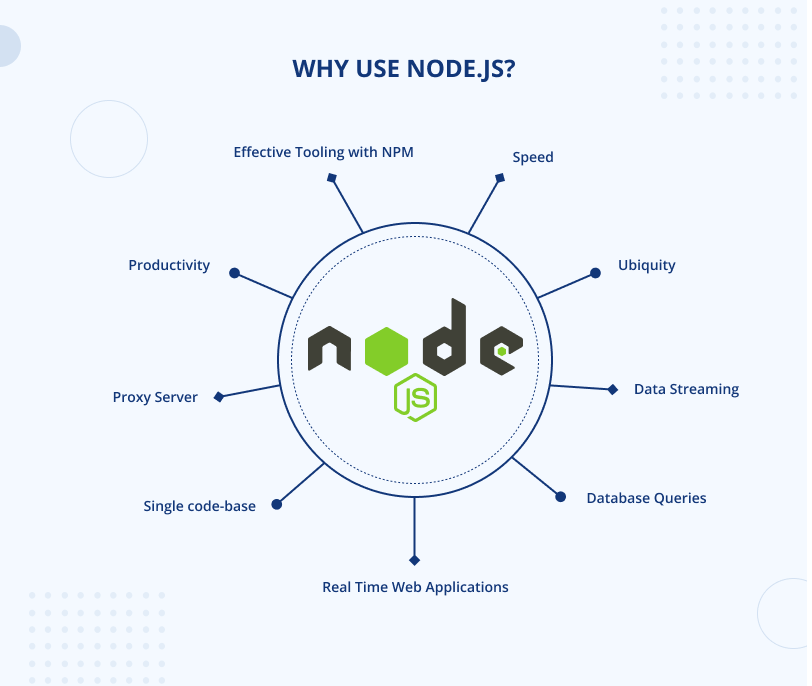Why use Node.js as a technology for backend development?
by admin
| January 10, 2024
In the ever-evolving landscape of app and web development, choosing the right backend technology is crucial for building scalable, efficient, and responsive applications. One technology that has gained significant traction in recent years is Node.js. Born on the server side, Node.js has become a go-to choice for developers, revolutionizing the way we think about backend development.
1. How Node.js is Beneficial for Backend Development?
- Single Language Across Stack: One of the key advantages of Node.js is its ability to use JavaScript on both the client and server sides. This unification simplifies development, as developers can use the same language and codebase for both frontend and backend, fostering better collaboration and reducing context-switching overhead.
- Asynchronous and Event-Driven Nature: Node.js operates on a non-blocking, event-driven architecture. This enables handling multiple connections simultaneously without waiting for one to complete before moving to the next. The asynchronous nature of Node.js makes it particularly suitable for I/O-intensive operations, leading to faster and more efficient applications.
- Scalability and Performance: Node.js is popular for being lightweight and scalable design. It excels in handling concurrent connections, making it ideal for real-time applications and situations where high performance is crucial. Its event-driven model allows for better utilization of resources, contributing to enhanced scalability.
- Large and Active Community: Node.js boasts a large and vibrant community of developers. This means an extensive pool of resources, libraries, and modules that can be leveraged to accelerate development. The community actively contributes to the growth and improvement of Node.js, ensuring that it stays relevant and up-to-date.
2. Trends and Reasons to Choose Node.js
2.1 Real-Time Applications:
Node.js is a natural fit for real-time applications, such as chat applications, online gaming, and collaborative tools. Its ability to handle concurrent connections and events in real-time makes it the preferred choice for applications requiring instant updates and communication.
2.2 Microservices Architecture:
As the trend toward microservices architecture gains momentum, Node.js shines as an excellent choice. Its modular and lightweight nature allows for the creation of microservices that can communicate seamlessly, enhancing flexibility, scalability, and maintainability.
2.3 Single Page Applications (SPAs):
Node.js is well-suited for developing SPAs where a smooth and responsive user experience is crucial. Its asynchronous nature and the ability to handle multiple requests concurrently make it an ideal backend choice for SPAs.
2.4 DevOps and Containerization:
Node.js aligns well with DevOps practices and containerization technologies like Docker. Its lightweight design and efficient resource utilization make it a suitable candidate for containerized deployments, contributing to easier scalability and management.
2.5 JSON Everywhere:
The prevalence of JSON (JavaScript Object Notation) in modern web applications aligns seamlessly with Node.js, as both JavaScript and JSON are integral parts of the technology stack. This simplifies data interchange between the front end and back end, promoting consistency and ease of development.
3. Best Practices and Considerations for Node.js Development
Proper Use of Asynchronous Code: While the asynchronous nature of Node is a strength, it requires careful handling of callback functions and event-driven programming. Developers should be mindful of callback hell and adopt practices for cleaner and more maintainable code.
Caching Strategies: Node can benefit significantly from caching strategies to improve performance. Implementing caching mechanisms for frequently accessed data can reduce the load on the server and enhance overall responsiveness.
Error Handling: Effective error handling is crucial in any development environment. In this technology, attention to error handling is essential to prevent unhandled exceptions from crashing the entire application. Properly structured error handling ensures a more robust and resilient application.
Scalability Considerations: While Node.js is inherently scalable, developers should be aware of potential bottlenecks in the application architecture. Strategies like load balancing, vertical scaling, and horizontal scaling can be employed to ensure optimal performance as the application grows.
Embracing the Future of Backend Development
Node.js has emerged as a powerful and versatile backend technology, offering multiple benefits for app and web development. Its asynchronous nature, scalability, and ability to unify frontend and backend development make it a compelling choice for developers and businesses alike. As the trends in real-time applications, microservices architecture, and containerization continue to shape the development landscape, Node.js stands as a reliable and forward-looking solution.
Whether you’re building the next-generation application or enhancing an existing one, embracing Node.js could be the key to unlocking a new level of efficiency and performance in your backend development journey.
 Development Services
Development Services Technologies
Technologies ICO
ICO ICO Marketing
ICO Marketing










